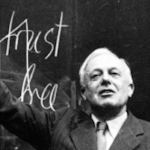Peter Brown reviews of Sarah Ruden’s new translation of Augustine’s Confessions in this weeks New York Review of Books. I can’t speak to the translation, but I can speak to the reviewer: Everything Peter Brown writes is worth reading.
He comments on Ruden’s decision to translate dominus as “master” (as in master of slaves) rather than as “Lord.” Brown thinks Ruden captures some tonalities that might otherwise be missed, but gently worries that Ruden might underplay “Augustine’s images of the tenderness of God.”
God as physician, for instance: “In the ancient world, the doctor was not the icy professional that he or she has become in the modern imagination. Unlike the surgeon, with his dreaded bag of knives, the doctor entered the house as a figure of magical, tender care. In a world with nothing like modern anesthesia, the doctor stood for the one principle of gentle change made available to bodies all too often held rigid on the rack of pain. His skilled words brought comfort, if only to the mind. His skilled hands played across the body, untying, where possible, the knots of pain. His drugs always carried with them reassuring traces of occult energies culled from herbs, which worked slowly and silently to bring the pain-wracked body back to its natural state.” Augustine makes a lot of God as the physician of souls.
Brown takes the opportunity to explore what he calls Augustine’s “deadly gift for miniaturizing sin.” As he points out, “There are no large sins in the Confessions. Those that he examines most closely are tiny sins.” Readers looking for salacious detail are disappointed, but Brown explains what Augustine is up to:
“Only by winnowing every motive that played into that obscure act of small-town vandalism was Augustine able to isolate the very smallest, the most toxic concentrate of all—the chilling possibility that he had acted gratuitously, simply to show that he (like God, and then like Adam) could do whatever he wished.”
When Augustine describes “larger” sins – like sexual lusts – his attention is still on the micro-level: “He speaks of these urges as a viscum—as a form of birdlime. We should note the terrible precision of this word. Birdlime is not only sticky. It is transparent. This barely visible substance would be placed at the end of a rod that would then be inserted among the boughs of a tree in such a way that the unsuspecting bird would hop without noticing from the living branch on to the adhesive surface. . . . This barely perceptible, cloying glue—and not the hot pleasures of the bed, as we might expect—was what preoccupied the bishop. It might still brush against the wings of his soul, slowing, if only a little, his ascent to God.”
He miniaturizes sin in order to isolate sin’s Adamic essence: The desire to be as god, determining good and evil.












